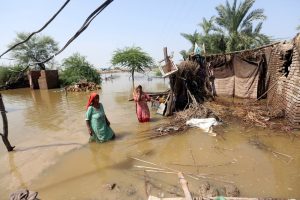The recent floods that Pakistan is facing have taken a huge toll on that country. One third of the country is submerged in water, over 1,000 people have so far been killed, 33 million or one-seventh of the country’s population have been rendered homeless and more than 300,000 dwellings have been flattened. Crops on vast swathes of land are destroyed and a food crisis is looming large.
Hunger, waterborne diseases and displacement of millions of people are the immediate consequences. In short, it is a humanitarian crisis of unimaginable proportions prompting international agencies to rush aid – monetary and material – to Pakistan. The spectacle of famished men, women and children trying to save their lives and find safe shelters is heart-rending.
All these are tell-tale signs of what catastrophe climate change can cause to the human race irrespective of the geographical frontiers within which people live. International experts, working on the impact of global warming and alerting the world with their findings for the past few years, have said that apart from monsoon rains, the melting of glaciers in the Himalayas is a major cause of the floods wreaking havoc on Pakistan. The country’s climate change minister, Sherry Rehman, says the floods – “caused by melting glaciers and torrential monsoon” – are the worst in living memory.
Vitally important agricultural land will take months to drain. Closer home, deadly floods hit northeastern India and Bangladesh recently due to which over 9 million people have been affected and over 300 people have been killed. The states of Assam, Meghalaya, Arunachal Pradesh, Tripura have been badly affected.
Orissa too has had its share of torrential rains and devastating floods this monsoon. The government of Orissa has disclosed statistics of flood damage in the state. According to the statistics, crops standing on a whopping 120,000 hectares of agricultural land have been damaged in 10 districts of Orissa.
Assessment in other districts is in process. On the other side of the border, the Pakistan government is pleading that developed nations responsible for global warming through greater emissions of greenhouse gases should bear the responsibility of the affected people of the country as Pakistan accounts for less than one per cent of global carbon emission. Pakistan has more glaciers – 7,532 – than anywhere on Earth outside the polar region.
As such, it is one of the countries that is most endangered by use of fossil fuel, rise in temperatures and other extreme weather events that is caused by global warming and climate change. Only a few months ago, a large body of climate change scientists mapping the extent of global warming through noxious fumes generated by fossil fuel reported that man-made climate change is responsible for the deadly heatwaves afflicting Pakistan and India, apart from the Western countries. Studies are also being conducted to quantify the precise contribution of greenhouse gases to this season’s catastrophic monsoon.
The reports are awaited. There is, however, no gainsaying that a man-made climate emergency is round the corner. The floods in Pakistan, like recent heatwave conditions, droughts and fires in many parts of the world, are to be seen in this light.
That is why the tragedy in Pakistan is a concern for the entire global population. Though the IMF and other global financial bodies are planning how best they can bail Pakistan out, the country’s history of corruption and aid to terrorist outfits makes many donors hesitant about loosening their purse strings. Reports suggest efforts are on to provide the logistics for allowing movement of food from India to Pakistan at this hour of crisis.
The COP26 summit last year coined a new term – climate finance – for providing monetary help to countries suffering from climate change. This form of aid is conceived not merely to handle usual natural disasters. Instead, it is a transfer of wealth built up over centuries of fossil fuel extraction for enabling a global transition away from carbon and towards a sustainable way of life.
Developed countries which have benefitted from the natural resources and human labour of developing countries have to now face payback. .
From: orissapost
URL: https://www.orissapost.com/now-payback/



